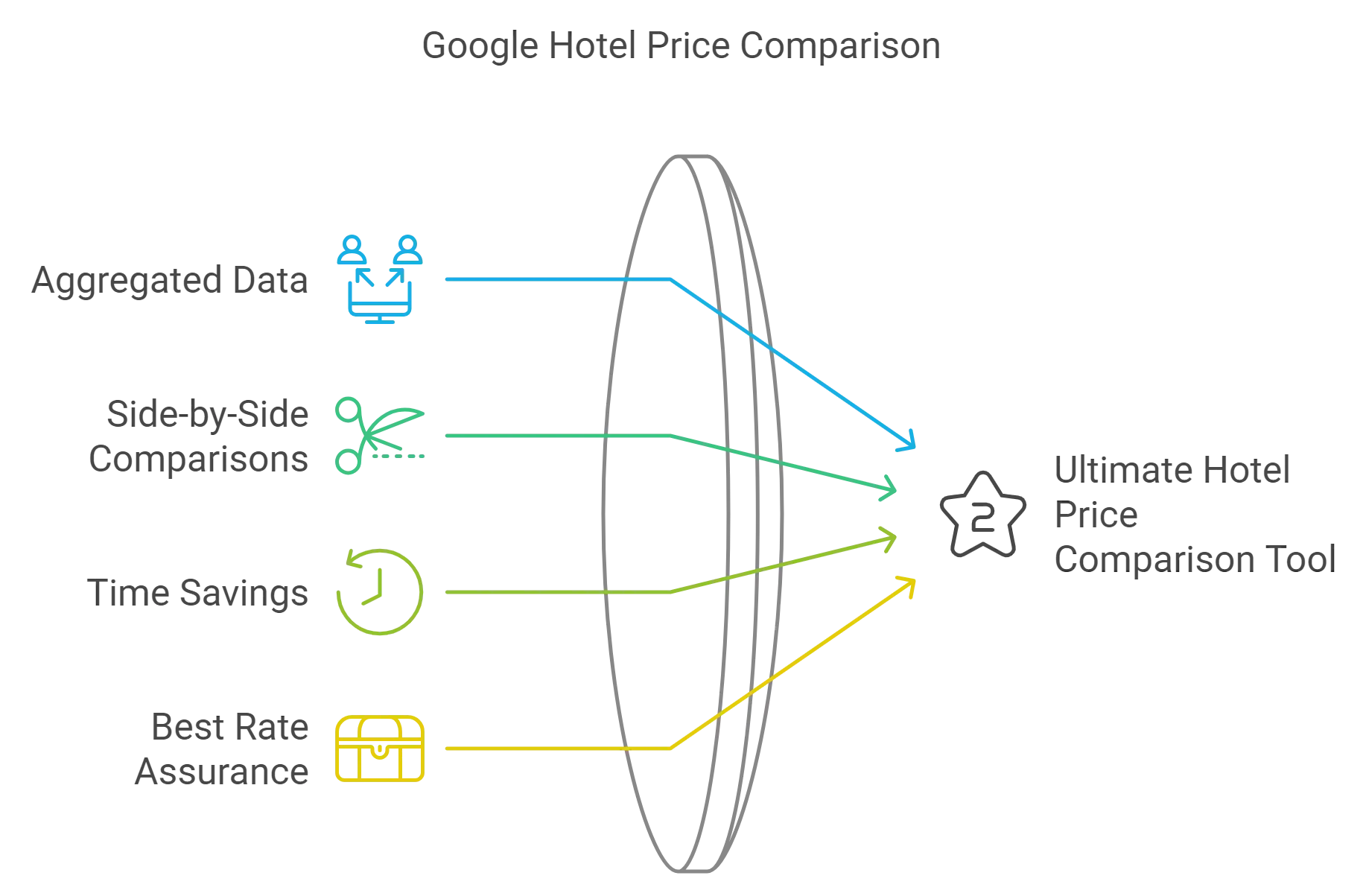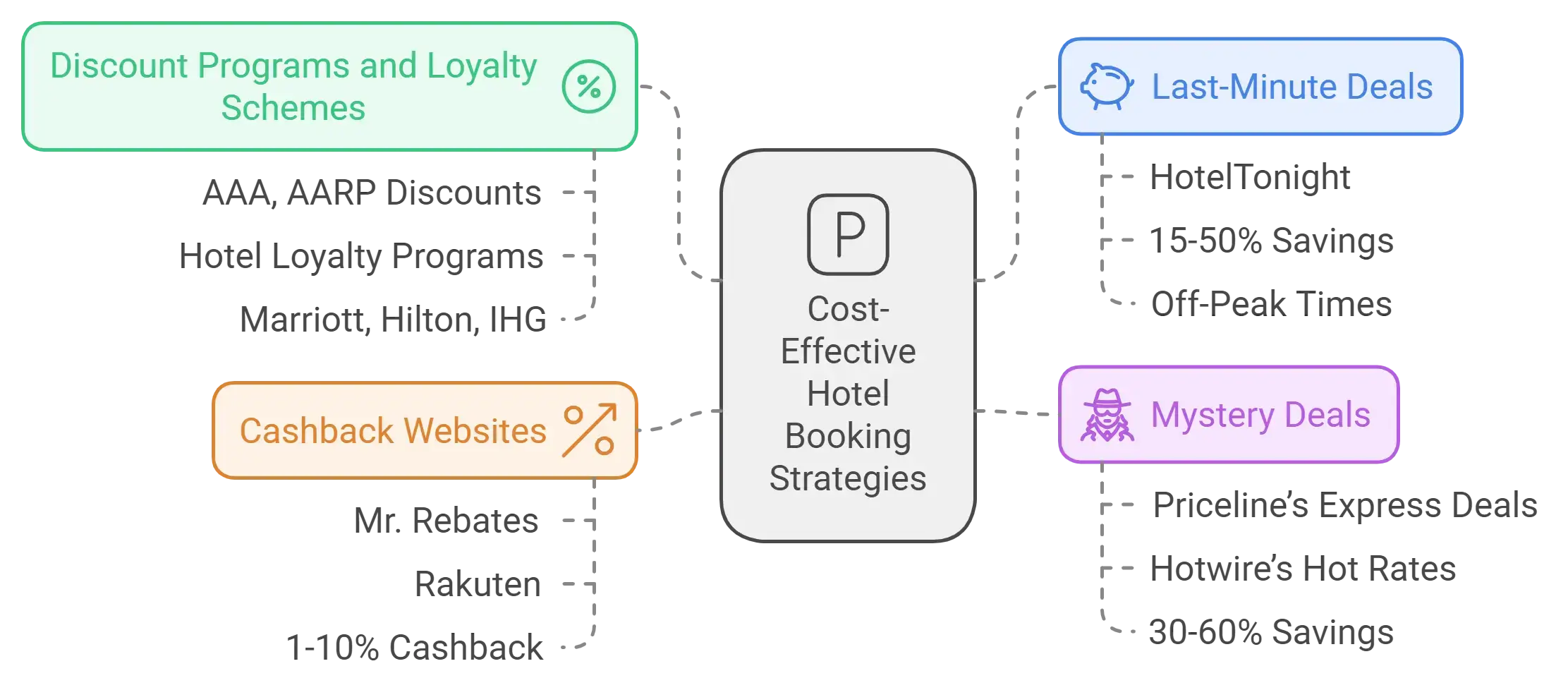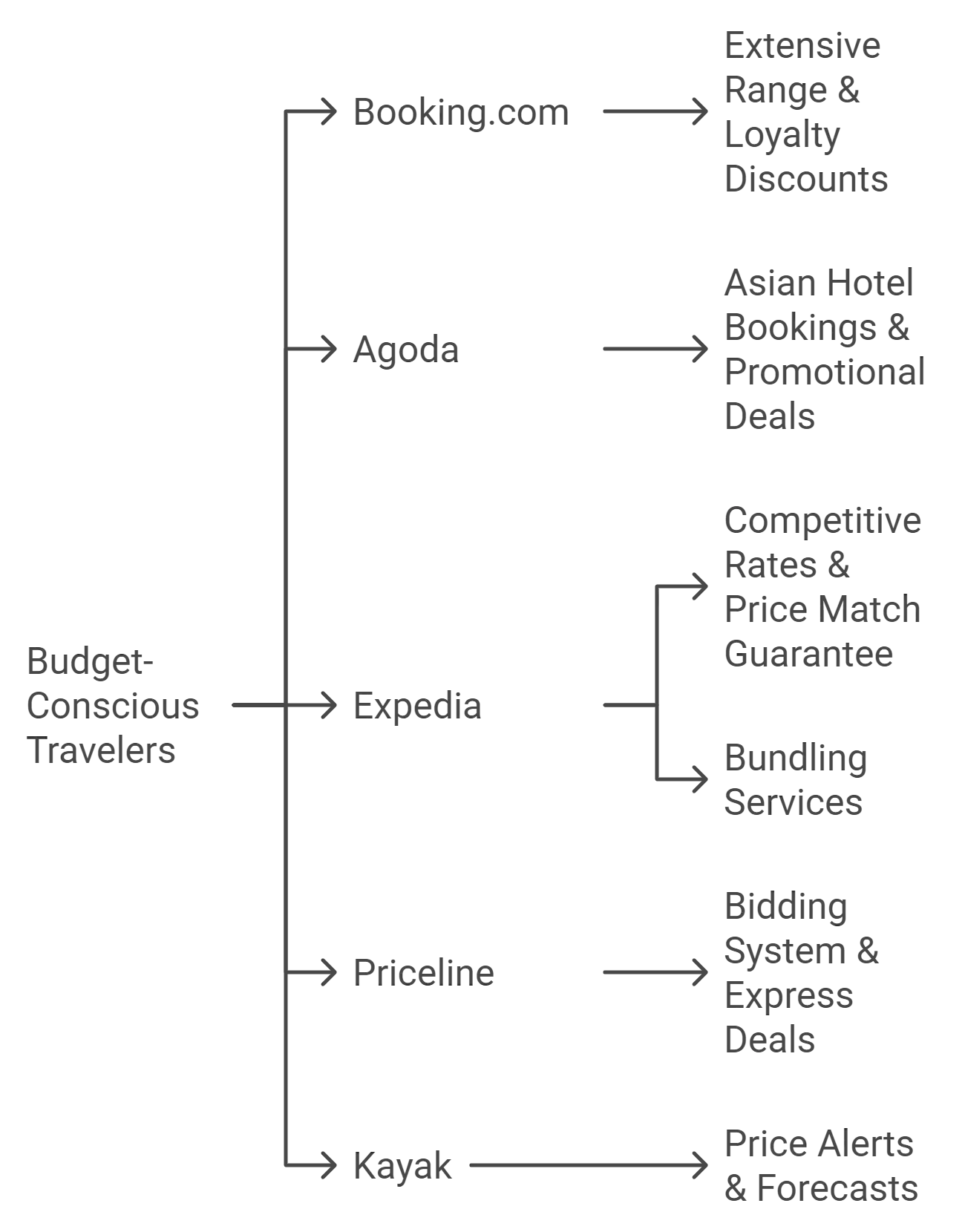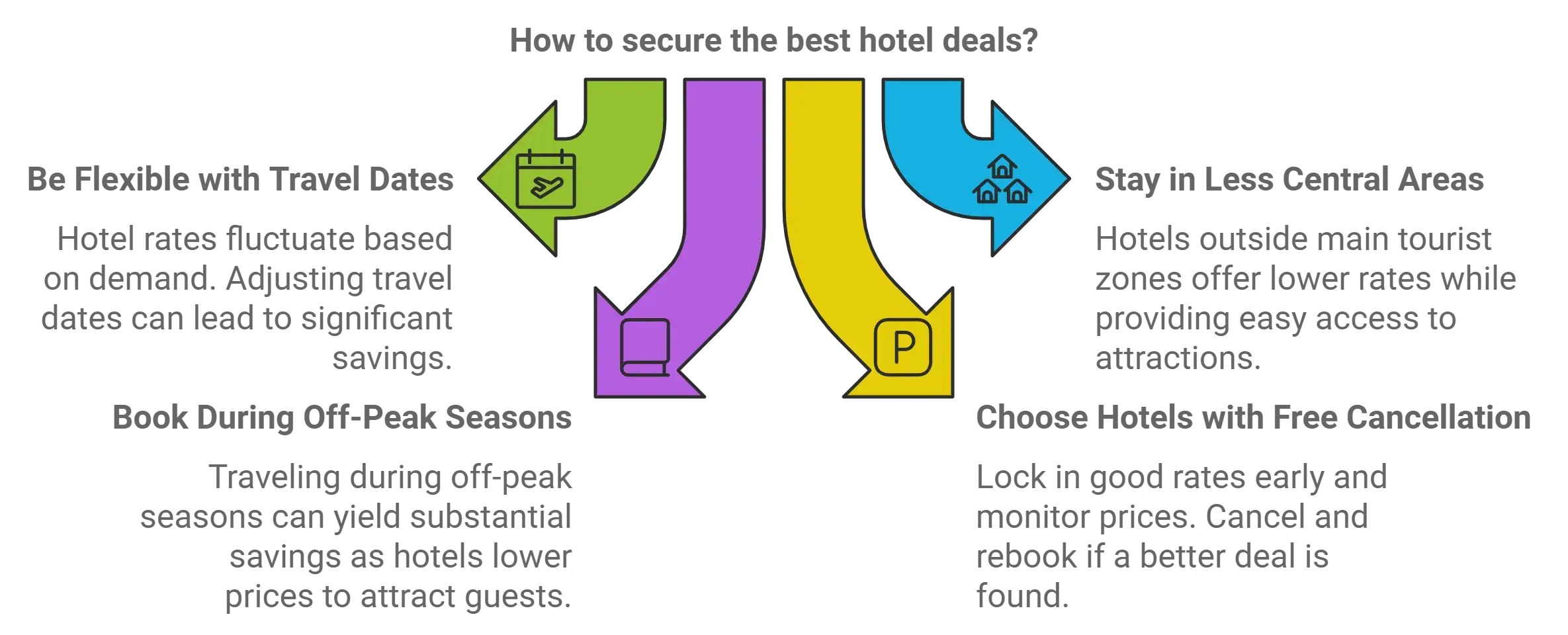Unlocking Cheap Hotel Deals: How Google and Other Strategies Can Save You Money

In today’s fast-paced world of travel, finding affordable accommodation can often feel like a daunting task. With countless booking sites, fluctuating prices, and endless options, the search for a budget-friendly hotel can quickly become overwhelming. Travelers not only need to sift through an array of platforms but also ensure they’re getting the best value for their money.
Enter Google, the ultimate tool for simplifying this process. By offering real-time price comparisons across multiple booking websites, Google has become a go-to solution for budget-conscious travelers. In this guide, we’ll dive into why Google is the most efficient platform for finding cheapest booking website deals and explore additional strategies that can help you save even more.
1. Why Google is the Ultimate Hotel Price Comparison Tool
When it comes to finding the best deals on hotels, Google reigns supreme. Its powerful search engine pulls prices from various travel and booking websites, offering users a comprehensive view of the market. Unlike individual booking platforms, which only show their own listings, Google aggregates data from several sources, including Booking.com, Expedia, Priceline, and more. This makes it a one-stop shop for comparing prices and finding the most cost-effective options.
Google’s efficiency lies in its ability to show side-by-side price comparisons, helping travelers quickly identify the best deals without the need to visit multiple sites. This feature not only saves time but also ensures you’re getting the best available rate for your desired location and dates.

1.1 How to Use Google for Cheap Hotel Bookings
Here’s a step-by-step guide on how to leverage Google’s hotel booking features:
- Start with a Basic Google Search
Open Google and type in your destination along with “hotels” (e.g., “New York City hotels”). This will trigger a dedicated hotel search interface within Google’s search results. - Click “View Hotels”
After the search results appear, click on the “View hotels” button. This will direct you to Google’s hotel booking interface, where you’ll see a list of hotel options in your chosen destination. - Enter Travel Dates
Input your travel dates to get the most accurate pricing. The results will adjust to reflect availability for your specified period. - Apply Filters
Use Google’s extensive filtering options to refine your search. Filters include price range, star rating, amenities (such as free Wi-Fi or breakfast), and more. You can also set preferences like guest ratings and hotel type. - Sort by Price
To ensure you find the cheapest option, sort the results by price from lowest to highest. Google automatically shows prices from multiple booking sites next to each hotel, making it easy to compare the best offers. - Use the Map Feature
Google’s interactive map allows you to see where each hotel is located, so you can choose based on proximity to attractions or preferred neighborhoods. - Compare Prices Directly
Google pulls prices from multiple booking platforms, showing you a list of websites like Booking.com, Hotels.com, and Agoda. This way, you can instantly compare deals without having to open new tabs or visit separate sites.
Top Contenders for cheapest booking website
1. Google Hotels
Overview: Google Hotels is well-known for offering some of the lowest average prices across various locations and an extensive number of search results. Its powerful search capabilities and a range of filtering options make it a favorite among budget-conscious travelers looking for tailored options.
Pros:
– Consistently among the cheapest on average
– Numerous filtering options for refining search results
– Broad search coverage, providing more choices
Cons:
– Some prices may increase upon clicking through to the final booking site
– Limited rewards program compared to other platforms
2. Trivago
Overview: Trivago ranks as the second-cheapest hotel booking site overall, with a streamlined set of results that make it easy to find affordable options. As both an aggregator and an OTA, Trivago combines its own listings with those from multiple providers for simplified comparison.
Pros:
– Focused results to make selection quicker and easier
– Affordable pricing without overwhelming search returns
– Effective blend of aggregator and OTA functionality
Cons:
– Does not offer a loyalty or rewards program for repeat customers
3. Kayak
Overview: Known for generating a vast number of search results, Kayak often leans towards lower prices and includes a “Price Forecast” feature that helps travelers predict the best times to book for optimal savings.
Pros:
– Extensive search results for a wide range of options
– Price prediction feature to help users time their bookings
Cons:
– Some prices require login or membership access
– Potential risk of listings from lesser-known or less reputable sites
4. Booking.com
Overview: Booking.com consistently offers competitive pricing, though not always the lowest, and adds value through its Genius loyalty program. This program rewards frequent users with perks like discounts, room upgrades, and even complimentary breakfasts, making it a reliable platform for affordable stays.
Pros:
– Genius loyalty program with perks such as discounts, upgrades, and free breakfasts
– Reliable platform with consistent pricing and a solid reputation
Cons:
– Prices may not always be the absolute lowest, focusing more on balanced affordability and added benefits
2. Additional Cost-Effective Hotel Booking Strategies
While Google is an incredibly efficient tool for comparing hotel prices, there are additional methods that can help you save even more on your next stay. From leveraging discount programs and loyalty schemes to exploring last-minute deals, mystery savings, and cashback options, these strategies can be the perfect complement to your Google searches.

2.1 Utilizing Discount Programs and Loyalty Schemes
If you’re part of organizations like AAA or AARP, you have access to exclusive discounts on hotel bookings. Many hotels and booking platforms offer special rates for members of these programs, often providing savings of 10-20% on standard room rates. Similarly, hotel loyalty programs, such as those offered by major chains like Marriott, Hilton, or IHG, can yield significant benefits. Members accumulate points with each stay, which can later be redeemed for free nights, room upgrades, or other perks.
These discount programs and loyalty schemes are especially useful when used alongside Google’s price comparison tool. For example, once you’ve identified the cheapest booking site through Google, you can check if any additional discounts are available through your memberships or loyalty programs, ensuring you’re maximizing savings on every level.
2.2 Exploring Last-Minute Deals
For travelers with flexible plans, last-minute booking platforms can offer substantial savings. Apps like HotelTonight specialize in securing last-minute hotel deals, often offering up to 50% off regular rates. These platforms work by filling unsold rooms that hotels want to offload quickly, making it a win-win for both the hotel and the spontaneous traveler.
For example, you might find a luxury hotel offering a steep discount on the day of booking because they’re trying to avoid having empty rooms. This tactic can work particularly well in major cities or during off-peak times when hotels have more vacancies.
Statistics show that last-minute bookings can save travelers between 15-50%, depending on location and time of year. However, it’s important to note that while last-minute deals are often great for solo or short trips, they may not always guarantee availability for families or during peak travel seasons.
2.3 Mystery Deals for Maximum Savings
If you’re open to a little uncertainty, mystery deals offered by platforms like Priceline’s Express Deals and Hotwire’s Hot Rates can yield significant savings. These deals allow you to book a hotel at a discounted rate without knowing the hotel’s name until after the reservation is confirmed.
While it may sound risky, these mystery deals can save travelers anywhere from 30-60% on hotel bookings. You’ll still be provided with key details like the star rating, location, and guest reviews, so you’re not entirely in the dark. For savvy travelers who don’t mind a bit of a gamble, this can be one of the most effective ways to secure a high-quality hotel at a budget price.
2.4 Cashback Websites
Another way to stack up savings is through cashback websites such as Mr. Rebates or Rakuten. These platforms partner with various hotel booking sites and offer users a percentage of their spending back in the form of cash. Typically, users can earn between 1-10% cashback depending on the site and the hotel booked.
To take advantage of this, simply visit one of these cashback websites, sign in, and follow their link to your preferred hotel booking platform. Once you complete your booking, a portion of your spend will be credited to your cashback account, which can later be withdrawn or applied to future purchases. This method works seamlessly with Google’s price comparison tool—once you’ve found the best rate on Google, you can head to the cashback site to earn even more savings.
3. Top Booking Websites for Budget-Conscious Travelers
In addition to Google, several booking websites consistently offer competitive rates for budget-conscious travelers. Each platform has its unique strengths, from loyalty rewards to specialized regional deals.

3.1 Booking.com
Booking.com is known for its vast range of budget-friendly hotels worldwide. The platform offers a variety of filters and options to narrow down your search, making it ideal for finding accommodations within your budget. Additionally, Booking.com’s “Genius” loyalty program offers regular users 10-15% discounts on select properties.
3.2 Agoda
Agoda is particularly strong for hotel bookings in Asia. Its user-friendly interface and frequent promotional deals make it a go-to platform for those seeking affordable accommodation in cities like Bangkok, Tokyo, or Bali. Agoda often features flash sales and exclusive mobile-only deals, providing extra savings.
3.3 Expedia
Expedia not only offers competitive hotel rates but also provides a price match guarantee, meaning they will refund the difference if you find a lower price on another platform. Expedia is also great for bundling services such as flights, car rentals, and local activities, which can lead to further savings on your trip.
3.4 Priceline
Priceline is renowned for its bidding system, which allows users to name their price for a hotel room. While this can be a bit of a gamble, it can result in substantial discounts for those who are flexible with their accommodations. Priceline’s Express Deals are another way to save, offering lower prices on hotels where the name is only revealed after booking.
3.5 Kayak
Kayak is a popular platform for its price alerts and price forecast tools. These features notify travelers when prices are likely to increase or decrease, helping them time their bookings for maximum savings. Kayak also compares prices across multiple platforms, much like Google, but with the added benefit of price trend data to guide your decision.
4. Expert Tips for Securing the Best Hotel Deals
Securing the best hotel deals goes beyond just using price comparison tools—savvy travelers know how to optimize every aspect of their bookings. Here are some expert tips to help you make the most of your search for affordable accommodations:

Flexibility with Travel Dates
One of the most powerful ways to save money on hotels is to be flexible with your travel dates. Hotel rates fluctuate based on demand, and simply adjusting your trip by a day or two can make a significant difference in price. Midweek stays, for example, are typically cheaper than weekend bookings. Additionally, traveling during off-peak seasons (think avoiding major holidays or peak tourist periods) can also yield substantial savings.
Staying in Less Central Areas for Cheaper Rates
While staying in the heart of a city might sound appealing, it often comes at a premium. Hotels located just outside the main tourist zones or in suburban areas tend to offer lower rates, while still providing easy access to major attractions via public transportation. This is especially true in larger cities where a short metro or bus ride can take you into the city center without breaking the bank.
Booking During Off-Peak Seasons
Traveling during off-peak seasons is a tried-and-true method for saving on hotel accommodations. For instance, beach destinations are often much cheaper during the fall or winter months, and mountain resorts offer better rates outside of ski season. Hotels lower their prices during these slower periods to attract more guests, meaning you can enjoy significant savings without sacrificing quality.
Choosing Hotels with Free Cancellation Policies
Booking hotels with free cancellation policies provides not only peace of mind but also financial flexibility. With these bookings, you can lock in a good rate early and continue monitoring prices as your travel dates approach. If you find a better deal later on, you can cancel your original reservation at no cost and book the cheaper option instead. This strategy ensures you’re always getting the best possible rate.
Using Price Tracking Tools to Watch for Price Drops
Price tracking tools are a must for travelers looking to snag the best deal. Websites like Kayak and apps such as Google Hotels allow you to set alerts for specific hotels or locations, notifying you when prices drop. By keeping an eye on these fluctuations, you can time your booking to capitalize on the lowest rates, ensuring you’re not overpaying.
Conclusion
Finding cheap hotel deals doesn’t have to be a daunting task. By using Google as a powerful price comparison tool, you can quickly and efficiently identify the best rates across various booking platforms. Combine Google’s search capabilities with other cost-saving strategies—such as taking advantage of discount programs, exploring last-minute deals, and utilizing cashback sites—to ensure you’re maximizing your savings. Flexibility, smart timing, and careful tracking will all work in your favor, helping you unlock the best hotel deals without compromising on comfort or quality.
FAQ Section
1. What is the best way to find cheap hotel deals?
The best way to find cheap hotel deals is to use Google’s hotel price comparison tool. Google pulls prices from multiple booking platforms like Booking.com, Expedia, and Hotels.com, allowing you to compare rates side by side. This helps you quickly identify the most affordable option without visiting several different sites.
2. Are last-minute hotel bookings cheaper?
Yes, last-minute hotel bookings can often be cheaper, especially through apps like HotelTonight. These platforms offer significant discounts (up to 50% off) on unsold hotel rooms, making it a great option for spontaneous travelers looking for luxury stays at budget prices.
3. How do hotel loyalty programs help save money?
Hotel loyalty programs, such as Marriott Bonvoy or Hilton Honors, allow you to accumulate points with each stay, which can later be redeemed for free nights, upgrades, or other perks. These programs can offer savings of 10-20%, especially when used in combination with other booking strategies like Google’s price comparison tool.
4. What are mystery hotel deals, and are they worth it?
Mystery hotel deals from platforms like Priceline Express Deals or Hotwire Hot Rates offer discounted hotel bookings where the hotel name is revealed only after payment. These deals can save you 30-60%, making them a great option for those who are flexible about the exact property but still want to enjoy significant savings.
5. Can cashback websites help with hotel bookings?
Yes, cashback websites like Rakuten or Mr. Rebates can help you save more on hotel bookings by offering a percentage of your spending back in cash. After finding the best deal through Google, visit one of these platforms to complete your booking and earn cashback, often ranging from 1-10%.
1. What is the best way to find cheap hotel deals?
The best way to find cheap hotel deals is to use Google’s hotel price comparison tool. Google pulls prices from multiple booking platforms like Booking.com, Expedia, and Hotels.com, allowing you to compare rates side by side. This helps you quickly identify the most affordable option without visiting several different sites.
2. Are last-minute hotel bookings cheaper?
Yes, last-minute hotel bookings can often be cheaper, especially through apps like HotelTonight. These platforms offer significant discounts (up to 50% off) on unsold hotel rooms, making it a great option for spontaneous travelers looking for luxury stays at budget prices.
3. How do hotel loyalty programs help save money?
Hotel loyalty programs, such as Marriott Bonvoy or Hilton Honors, allow you to accumulate points with each stay, which can later be redeemed for free nights, upgrades, or other perks. These programs can offer savings of 10-20%, especially when used in combination with other booking strategies like Google’s price comparison tool.
4. What are mystery hotel deals, and are they worth it?
Mystery hotel deals from platforms like Priceline Express Deals or Hotwire Hot Rates offer discounted hotel bookings where the hotel name is revealed only after payment. These deals can save you 30-60%, making them a great option for those who are flexible about the exact property but still want to enjoy significant savings.
5. Can cashback websites help with hotel bookings?
Yes, cashback websites like Rakuten or Mr. Rebates can help you save more on hotel bookings by offering a percentage of your spending back in cash. After finding the best deal through Google, visit one of these platforms to complete your booking and earn cashback, often ranging from 1-10%.




Comment (0)